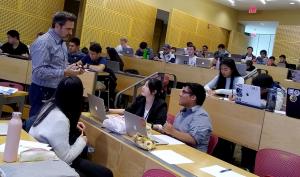Panagiotis Apostolellis
About
Panagiotis Apostolellis is a full-time Associate Professor in the Computer Science Department at the University of Virginia. He received his PhD in Computer Science & Applications from Virginia Tech in 2017. He also holds a MSc in Computer Science from Virginia Tech and an MSc in Human-Centered Systems from the University of Sussex (UK). Additionally, Panagiotis has a Graduate Certificate in Human-Computer Interaction from Virginia Tech (2015). While a graduate student at Virginia Tech (2011-2017), he worked at the Center for Human-Computer Interaction under the guidance of Dr. Doug Bowman, researching the impact of audience interaction using serious games and VR on young student audiences visiting informal learning spaces. His teaching experience involves being an Adjunct faculty member and a Visiting Assistant Professor at Virginia Tech, serving as a Teaching Assistant in multiple CS courses, and teaching diverse audiences about IT and New Media Technologies. His dissertation received the Outstanding Research award for 2017-2018 from the CS department at Virginia Tech. Panagiotis has also extensive experience as a Senior Interactive Systems Designer and Developer at a cultural institution in his home country, Greece (2000-2011).
Education
Computer Science and Applications, PhD (Virginia Tech, 2017)
Computer Science and Applications, MSc (Virginia Tech, 2015)
Human Centered Computer Systems, MSc (University of Sussex, 1998)
Electrical Engineering, BSc (TEI of Western Greece, 1996)
"We don't stop playing because we grow old; we grow old because we stop playing." Borrowing this quote from George Bernard Shaw, I strongly believe learning should be fun and playful in order to be effective. This motto drives me personally but also the way I structure my classes and the types of topics I research. If you have a fun and potentially impactful idea, bring it to me!"
